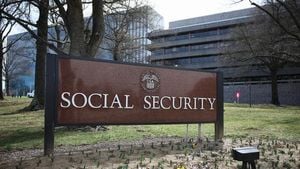Workers at Whole Foods Market's flagship store in Center City, Philadelphia, have made history by voting to unionize, marking the first successful unionization at the grocery store chain under Amazon's ownership. The votes were counted on Monday, resulting in 130 employees favoring union representation with the United Food and Commercial Workers (UFCW) union, compared to 100 against.
This landmark decision is seen as part of the broader labor movement gaining momentum across the United States. The vote is particularly significant as it encapsulates the workers' desire for higher wages and improved benefits, amid concerns over reduced staffing levels since Amazon acquired Whole Foods for $13.7 billion back in 2017. Ed Dupree, a union organizer, explained the challenges many workers face, stating, "During my eight years at Whole Foods, business has grown significantly, yet staffing levels have continuously decreased. Many of my coworkers are juggling multiple jobs and do not have health insurance, which makes it tough to get by."
The enthusiasm surrounding this unionization effort resonates not only within the company but also across various industries where workers are increasingly standing up for their rights. Wendell Young IV, president of the local UFCW chapter, expressed optimism about negotiations to come. He emphasized, "This fight is far from over, but today’s victory is an important step forward. We are ready to bring Whole Foods to the bargaining table to negotiate a fair first contract reflecting the workers' needs and priorities."
UFCW International President Marc Perrone echoed this sentiment, stating confidently, "This win sends a powerful message to workers everywhere: when we stand together, we can take on even the largest corporations and win." The successful organization at Whole Foods aligns with recent trends among supermarket workers feeling empowered amid tighter labor markets and increasing support for unions.
Workers articulated their concerns around low wages and inadequate benefits, particularly unsettling when juxtaposed against the backdrop of Amazon's significant profitability. "At our location, the starting wage is $16 per hour, which is certainly above Pennsylvania’s minimum wage of $7.25, yet many employees believe they deserve more, considering the region’s living wage expectations of around $24 per hour," Dupree adds. This disparity highlights the economic pressures employees face, as many veteran workers report struggling to afford basic necessities.
Although the union victory was celebrated, it wasn't without its criticisms of the conditions leading up to the vote. Some employees reported experiencing intimidation tactics from management—allegations included systematic misinformation campaigns aimed to dissuade workers from voting for unionization. One group of employees stated: "We faced a relentless campaign of intimidation, misinformation, and anti-union tactics from Amazon and Whole Foods management. Their tactics only fueled our determination and unity."
Despite the hopeful outlook following the unionization, the situation remains precarious. Whole Foods issued a statement expressing disappointment about the outcome, maintaining its commitment to employee welfare. "We are committed to maintaining a positive working environment at our Philly Center City store," company representatives noted. Yet, analysts anticipate challenges with negotiations. Labor expert Nelson Lichtenstein remarked, "Amazon's record of opposing unions suggests the company will try to delay contract negotiations, taking advantage of any uncertainty stemming from political changes affecting labor laws."
Indeed, this union victory arrives during a politically charged period, with recent developments indicating possible changes to the National Labor Relations Board (NLRB) under the new administration. Many experts fear this could hinder the momentum labor movements have recently gained. For example, Paul Clark, labor professor at Pennsylvania State University, pointed out how favorable conditions for union organizing might shift as new political dynamics emerge.
With the President’s administration taking measures such as firing key figures from the NLRB, the future of labor rights advocacy is uncertain. The Philadelphia Whole Foods workers' victory, though historic, could face obstacles as they push for their rights amid potential renewed corporate resistance—especially from one of the world’s largest retail conglomerates.
The outcome of the union election serves as not just a pivotal moment for the employees at Whole Foods but also an emblem of the shifting attitude toward unions across America. While many workers at this grocery chain look forward to negotiations, they also remain cautious about the realities of large-scale corporate pushback.
Only time will tell how effectively these workers can navigate the challenges moving forward. For many, the coming months could be filled with tests of resolve as they stand united for workers' rights within Amazon's expansive corporate structure.



